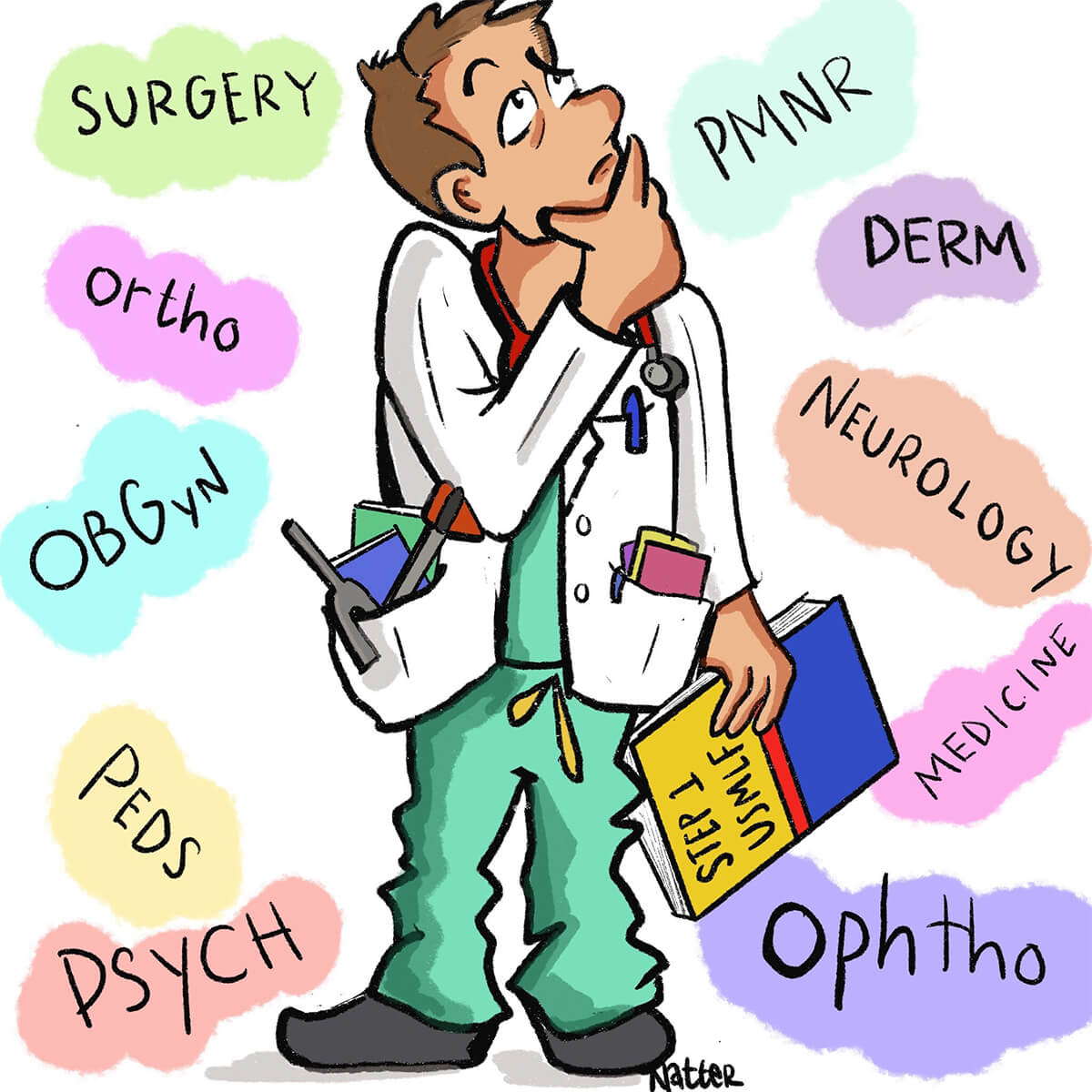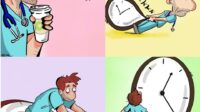The further you get into your medical school journey, the higher the pressure gets for you to decide what specialty best fits you as an individual and ultimately which one you will pursue in your residency. Some medical students may think they know exactly what to choose for their residency specialty from day one, but actual experience in the field may change their perspective. My own medical school journey led me down the path towards an internal medicine residency. It was certainly not a direct or clear path for me, but this is how I ended up choosing internal medicine for my residency specialty.
My First Clinical Rotation
It was June 2015 and I was a few short days away from starting my first clinical rotation. My short white coat was still white. My reference books weighed down the pockets. I was excited, anxious, and relieved to be done with the preclinical years and more importantly- USMLE® Step 1 – but my first rotation was general surgery and I knew I had an uphill battle.
I figured I might as well start with one of the more difficult rotations during the summertime, so that way at least when I woke up at 4AM and left my apartment it wouldn’t be freezing cold on the Philadelphia streets as I commuted to the hospital. I asked my upper year colleagues for their tips and tricks- “eat when you can, sleep when you can, and never touch the pancreas,” was a favorite, but also “if it’s blue, don’t touch it, actually don’t touch anything” was another good one. I was prepared. Or at least I thought I was but hey, how bad could it really be? Boy, it was BAD. It was hellacious. I hated it. I hated every second of it. In fact, I was so miserable I remember thinking “well, I haven’t gotten my Step 1 score back yet, maybe I failed and I can just quit this whole thing all together.”
I really thought going into a specialty that required an artistic mind, one where you use your hands to solve problems coupled with my years as an artist painting and molding clay would make me a natural, but to my surprise it did not appeal to me at all. I found aspects of the OR experience magical, but the personalities and pressure were immense. My childhood experience from when I was a patient receiving my Type 1 Diabetes diagnosis for the first time is what made me long to sit down and talk to my patients rather than wake them up at 5am to mash on their bellies and ask if they pooped. I didn’t mind the gore, the blood, the guts, but I missed the human connection especially when the only exposed portion of the draped patient was the surgical field, endotracheal tube stealing their voice, and propofol blunting their consciousness.
Learning About Myself Through Clinical Rotations
I then moved on to neurology which was more cerebral and academically interesting but it left me a bit depressed because once we localized the lesion, the patient’s outcome was still quite poor. I recall having to excuse myself in the middle of neuro ICU rounds to have a cry after breaking bad news for the 6th time for the day. My experience during these rotations showed me that surgery and neurology were not my calling so I ruled them out. On the bright side, I learned that I really enjoy the mental puzzle of medicine.
The remainder of my rotations flew by – psychiatry, pediatrics, ob-gyn. Psychiatry was great for the reason that I could sit and talk to my patient for an hour, but I missed the mental puzzle of pathophysiology and mechanisms. Pediatrics was fun, but I realized I preferred kids as kids and not as patients. Ob-gyn was interesting since it was the first rotation where I was dealing with healthy patients who were bringing life into the world but labor and delivery wasn’t for me. I thought internal medicine must be the right fit. Yet, when I finally rotated through my MS3 internal medicine block, I honestly did not love it…
From Self Doubt to a Revelation
I felt like a weirdo. Almost all my peers loved every single rotation and their problem was they wanted to choose ALL of them. Then there was me… did I make a mistake? It dawned on me that it wasn’t that I didn’t enjoy the specialties, it was that I was too stressed out by my role as medical student. As an MS3, I felt as though I was at the bottom of the totem pole. I felt like I needed to sing and dance for the residents and attendings. I wanted to appear smart, engaged, hard working and while doing that I did not get true insight into what the attending’s life was actually like. I needed to take a step back and ask myself, “what can I see myself doing every day?” and “what would get me out of bed in the morning?”, “what inspired me as a physician?”.
I had a realization that there were a few salient aspects that ended up helping me choose my residency specialty and field:
- Are these my people? Are the residents and attendings similar in personality and perspectives as myself? Can I see myself in their shoes in a few years? Can they be my mentors, colleagues, peers?
- Can I see myself doing what the attending is doing? Keep in mind, the role of medical student is temporary and the day to day is much different.
- Am I more of a tactile, procedural mindset or a more cerebral, deep thinker?
- How important is my work/life balance? Residency will be demanding in all fields but post-residency life can also be demanding of time depending on the specialty. Outpatient specialties can potentially allow for more structured scheduling with less emergencies as compared to some inpatient surgical subspecialties.
Upon asking myself these questions, I realized internal medicine was the right fit for me. Internal medicine is a bit of a pluripotent gateway into many different subspecialties that are vastly different and run the spectrum from highly procedural to entirely outpatient. Looking back now after finishing my internal medicine residency amidst the coronavirus pandemic, and as I begin my endocrinology fellowship, I know I made the right choice. I am surrounded by colleagues who inspire me to be better, but who also enjoy the intellectual exercise of differential diagnoses and connecting with their patients through longitudinal relationships. There is a path for us all.




